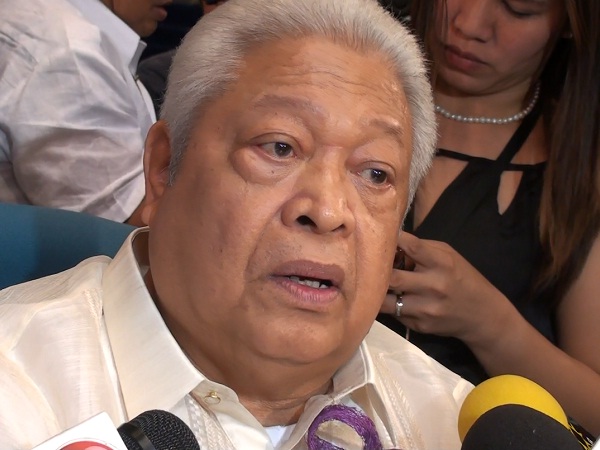Albay Rep. Edcel Lagman on Tuesday said the independent minority bloc in the House of Representatives would question the death penalty bill before the Supreme Court once the proposed measure is passed into law.
In a press conference at the House of Representatives, Lagman said the expected third reading approval of House Bill 4727 seeking to restore capital punishment is premature because it violates the three-day notice rule in the 1987 Constitution.
The bill was passed on second reading by viva voce last Wednesday.
READ: Death penalty bill inches closer to approval on Ash Wednesday
“It is not seasonable as it violates the three-day notice rule prescribed by Section 26(2) of Article VI of the Constitution,” Lagman said.
The said section in the Constitution states that “No bill passed by either House shall become a law unless it has passed three readings on separate days and printed copies thereof in its final form had been distributed to its Members three days before its passage, except when the President certifies to the necessity of its immediate enactment.”
Lagman also cited Sec. 58 of Rule X of the House rules which provides that: “No bill or joint resolution shall become law unless it passes three (3) readings on separate days and printed copies thereof in its final form are distributed to the Members three (3) days before its passage except when the President certifies to the necessity of its immediate enactment.”
Lagman said the third reading approval of the bill should be next week.
Still, whether or not the bill is passed this week or the next, Lagman said the minority bloc “Magnificent 7” would question the legality of the bill before the Supreme Court once the bill is signed into law.
“Our next step would wait until the President signs it into law, and once it is signed into law, hindi pa tuyo ang tinta, pupunta na kaming Korte Suprema (even though the ink is not yet dry, we will proceed to the Supreme Court immediately),” Lagman said.
Northern Samar Rep. Raul Daza cited violations of the procedures in the Constitution as well as the House rules as the legal infirmities to be raised before the Supreme Court.
Lagman said should the House approve the death penalty bill on Tuesday night and the Senate passes it by June, only then can the independent minority bloc proceed to the Supreme Court.
Lagman said the approval of the bill is imminent precisely because President Rodrigo Duterte is the “architect” of the reimposition of the death penalty.
“Today is the day of revelation who are strong-willed and who would succumb to intimidation,” Lagman said.
READ: ‘Killer congs’ challenged to show themselves up
The bill hurdled second reading approval by voice voting last week, which means there was no record how lawmakers registered their vote on the controversial bill.
Meanwhile, under third and final reading, lawmakers may explain their vote under nominal voting before passing the death penalty bill.
The death penalty bill is set to be approved on third and final reading Tuesday night.
READ: Death penalty bill up for final House approval next week
The death penalty bill has been amended to limit its coverage to drug-related offenses, in a bid to support the administration’s bloody narcotics crackdown that has claimed over 7,000 lives.
The bill as it has been amended excluded plunder, rape and treason from the death sentence.
READ: Death penalty bill now limited to drug offenses
The bill will not impose a mandatory death sentence, giving the judge the leeway whether to impose life sentence or the maximum penalty of death on convicts.
The bill will punish with death or life imprisonment the following drug-related offenses:
- importation of dangerous drugs
- sale, trading, administration, dispensation, delivery, distribution and transportation of dangerous drugs maintenance of a den, dive or resort
- manufacture of dangerous drugs and/or controlled precursors and essential chemicals
- misappropriation, misapplication or failure to account for confiscated, seized or surrendered dangerous drugs
- planting of evidence
Possession of drugs will only be penalized with the maximum offense of life imprisonment.
The bill stated that the death penalty should not be imposed on children below 18 years old or senior citizens over 70 years of age at the time of the commission of the crime.
The penalty will be carried out by hanging, firing squad or lethal injection. RAM
